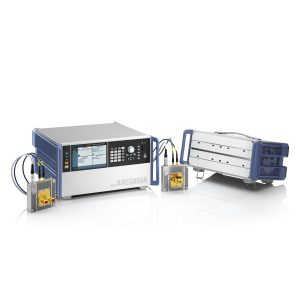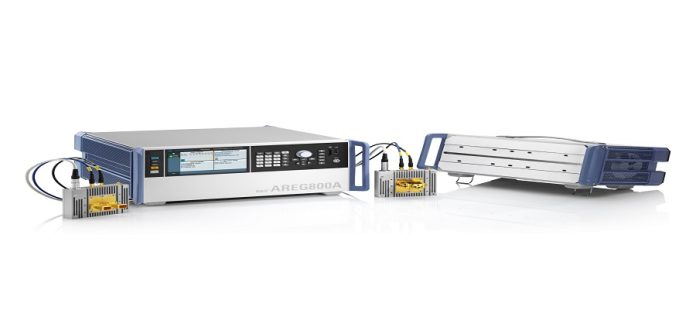The radar test system from Rohde & Schwarz simulates driving scenarios for testing radar-based advanced driver assistance systems (ADAS) and radar sensors used in automated driving cars (AD) entirely over the air. Now Rohde & Schwarz introduce new options for the R&S AREG800A automotive radar echo generator and the R&S QAT100 antenna array. The system is able to generate extremely short distances for the artificial objects and therefore enables realistic autonomous braking tests with the smallest distance possible on the market.

everything in between.
The Rohde & Schwarz radar test system (RTS) is perfect for radar object simulation, from single sensor tests to 360° environments, covering 76-81 GHz for automotive radar sensors. Its scalability and adaptability allow a wide range of ADAS traffic scenarios to be electronically generated along the whole testing lifecycle.
The solution consists of the R&S AREG800A automotive radar echo generator as a backend and the R&S QAT100 antenna array as a frontend and it can be used in benchtop development, Hardware-in-the-Loop and Vehicle-in-the-Loop. For production, the solution consists of the R&S AREG800A automotive radar echo generator as a backend and the R&S AREG8-24/81S/D antenna as a frontend. Now, with new options for the R&S AREG800A, the system is the most flexible and scalable on the market. From the automotive radar perspective, a higher instantaneous bandwidth improves the distance resolution. With the mmW remote frontends R&S AREG8-81S/D, the instantaneous bandwidth will be extended from 4 GHz to 5GHz, offering a future-proof solution so that the users can measure their automotive radars using a higher bandwidth. Laterally, highly accurate moving objects can be simulated using the R&S RTS. A new feature for near object range allows a minimum distance of one or more artificial objects to be reduced down to the airgap value of the radar under test.
For the R&S QAT100 Rohde & Schwarz introduces the new option R&S QAT-B1 ENHANCED FLATNESS. The R&S QAT-B1 contains a detailed characterization of each antenna of the QAT frontends. With this option, the accuracy of the amplitude flatness of all antennas is improved when operated with R&S AREG800A.
The R&S RTS enables tests currently performed in real-world test drives to be relocated to the lab, enabling errors to be detected at an early stage and delivering significant cost savings.










